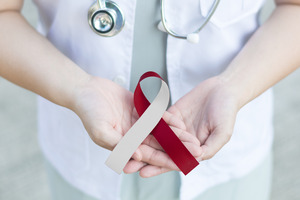
Did you know that nearly 54,000 new cases of oral cancer are diagnosed in the United States every year? It may not get as much attention as other types of cancer, but it can still be a life-threatening issue. Having oral cancer screened and diagnosed early could make all the difference for your chances of survival. Seeing as April is Oral Cancer Awareness Month, now is a good time to review some of the risk factors and symptoms associated with this disease.
Risk Factors for Oral Cancer
Tobacco use is one of the most significant risk factors for oral cancer. Studies have shown that people who smoke or use chewing tobacco are more likely to develop cancer in their mouths, and the chances only increase the more often they use such products.
Other risk factors to be aware of include:
- Gender: Men are twice as likely to develop oral cancer as women.
- Weight: Research indicates that excess body weight might increase the risk of cancer in the throat area near the back of the mouth.
- Age: Most oral cancer patients are over the age of 55.
- UV Light: When you spend a lot of time outside, you might be at risk for developing cancer on your lip due to sunlight exposure.
- HPV Infection: In the past few decades, there has been an increasing number of oral cancer cases linked to HPV.
- Poor Nutrition: People who don’t eat enough fruits and vegetables may be more likely to suffer from oral cancer.
Symptoms of Oral Cancer
Being familiar with the warning signs of oral cancer can help you catch it in its early stages. Common symptoms associated with oral cancer include:
- Sores in the mouth that don’t heal within two weeks.
- Patches of discolored soft tissue.
- Unusual lumps or hard spots.
- Odd growths (as in, any tissue that is raised above the surrounding area).
- A lump that can be felt on the outside of the neck that lasts two weeks or more.
- Areas that bleed easily when touched.
Note that your symptoms might be different depending on the underlying cause of your oral cancer. For example, if the disease is linked to an HPV infection, you might develop a persistent cough, or you may have trouble swallowing.
Keep in mind that even if you don’t notice the warning signs of oral cancer, your dentist might be able to catch them. An oral cancer screening is a normal part of every dental checkup. As such, if you want to give yourself the best chance of having your oral cancer identified and treated, you should remember to schedule a dental appointment every six months.
About the Author
Dr. Eric Heisser graduated from the University of Michigan School of Dentistry. He has been recognized as a Fellow of the Academy of General Dentistry, which is something that only 6% of dentists in the United States and Canada have been able to achieve. At Laketown Family Dental in Norton Shores, he can provide an oral cancer screening during a routine dental checkup. To schedule a consultation with Dr. Heisser, visit his website or call (231) 737-2273.
 (231) 737-2273
(231) 737-2273

 Appointment
Appointment